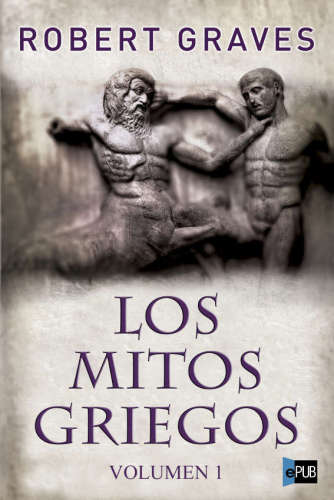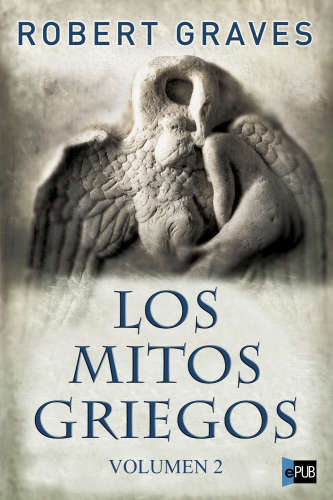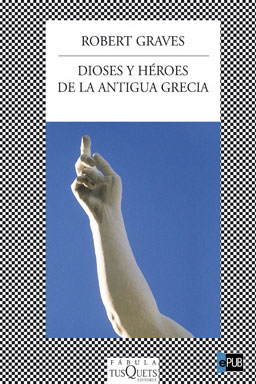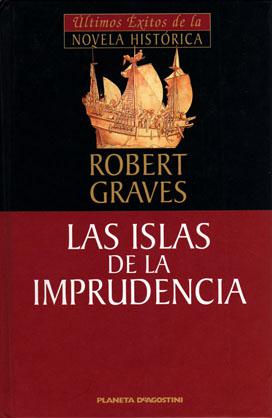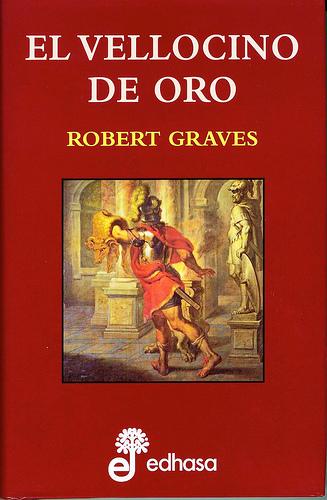oleebook.com
La Guerra De Troya de Graves, Robert
de Graves, Robert - Género: Ficcion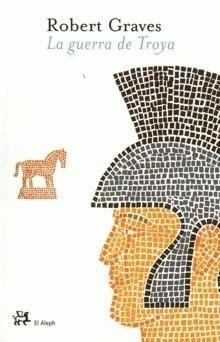
Sinopsis
Sin duda uno de los libros más hermosos de Robert Graves, La guerra de Troya es la recreación de uno de los hechos esenciales para la comprensión del mundo clásico griego y de la literatura épica. Los conflictos entre Aquiles y Agamenón, el escenario de la guerra, la personalidad de Héctor, son explicados con una prosa tan admirable como amena. Tal vez este es, en palabras de Graves, «el primer intento moderno de explicar toda la historia de Troya, desde la fundación de la ciudad hasta el retorno de los griegos victoriosos, en un libro breve. Esta novela, una de las más queridas del propio Graves, es, al final, mucho más que la mera explicación de una leyenda: es un alegato a favor de la amistad y en contra de la guerra, un homenaje a la literatura clásica y, por encima de todo, una aventura apasionante que se ha constituido ya en una pequeña obra maestra de este siglo.
Descargar
Descargar La Guerra De Troya ePub GratisLibros Recomendados - Relacionados
Reseñas Varias sobre este libro
3/5
???
Se trata de una novela corta, de menos de cien páginas, que abarca desde la fundación de Troya hasta su caída y el regreso de los héroes griegos que participaron en esa guerra, que da título a la novela. Por esto, captó mi atención de inmediato, aunque se comprende que se trata de un objetivo muy ambicioso en tan corto espacio que, sin embargo, resulta muy agradable de leer. Así pues, arrancamos desde la misma creación de Troya:
"Se dice que Troya fue fundada por el príncipe Escamandro que, a causa del hambre, se marchó navegando hacia el este, desde la isla de Creta, con un gran número de seguidores, dispuesto a fundar una colonia en algún hogar fértil".
Esta novela corta fue publicada hacia 1998, aunque había sido publicada anteriormente en 1962, en una colección titulada "Las novelas del verano" por la Biblioteca El Mundo, y debe reconocerse que responde perfectamente a tal marco. Su autor es Robert Graves, más conocido por la bilogía "Yo Claudio", publicada en 1934-35, y por "El conde Belisario", de 1938.
"Aquella misma noche Helena y Paris se fugaron en su rápida nave, tras subir a bordo la mayoría de los tesoros de palacio que ella había heredado de su padrastro"
Y he aquí la consecuencia de la promesa de Afrodita a Paris, al elegirla como la más bella en el certamen de la Manzana de Oro, que la diosa de la discordia Eris había lanzado en el convite de la boda de la nereida Tetis, por no haber sido invitada. Esta elección implicó la furia de Hera y Atenea, y lleva al conflicto que desencadena la guerra de Troya. Como puede verse, desde el principio, los dioses toman partido apoyando a los unos o a los otros ...
"Entonces ambos ejércitos se dirigieron hacia la llanura, donde Zeus todopoderoso le dio variedad a la batalla del día permitiendo que todos los dioses y las diosas tomaran parte y lucharan entre ellos si querían. Había cinco por cada bando ... ".
Sobre el desenlace de la guerra y el regreso de algunos de los héroes como Ulises, no haré spoiler, aunque seguro que ya conocéis a grandes rasgos lo ocurrido. Los nombres de los héroes protagonistas los conocemos desde la escuela: Héctor, Príamo o Deífobo entre los troyanos y Áyax, Aquiles o Ulises, entre los griegos. Aprovecho para comentar que los seguidores de Pérez Gellida también encontrareis referencias a Orestes y Pílades, tan presentes en la novela "Memento mori", primera de la serie dedicada al inspector Ramiro Sancho.
Pese a que la lectura es agradable, el problema está lógicamente en que compendia en menos de cien páginas los hechos narrados en la Ilíada, la Odisea y la Eneida, lo que es muy complicado y ambicioso. El resultado es un resumen sumario de lo ocurrido en Troya que, a veces, resulta muy abigarrado y denso por la gran cantidad de personajes que se asoman a la historia, algunos de ellos con poco recorrido. Es por esto por lo que mi valoración es de 3 estrellas, reconociendo no obstante el esfuerzo de síntesis necesario para acometer tal propósito y el resultado notable alcanzado en esta línea.
En cuanto al cine, quizás el referente más próximo sea la épica película "Troya", de Wolfgang Petersen, protagonizada por Brad Pitt y Orlando Bloom, donde, además de no aparecer muchos de los personajes de la obra, tampoco puede decirse que sea muy fiel el guion. Otra opción con buena crítica es "Helena de Troya", dirigida en 1956 por Robert Wise, y protagonizada por Rosana Podestá y Stanley Baker, entre otros.
Dicho esto, la novela es muy recomendable para todos aquellos que queráis refrescar la trama sin tener que releer a Homero o a Virgilio, para todos los amantes de las aventuras de guerra clásicas y para todos los que queráis divertiros con los héroes y dioses de la antigüedad, sin invertir una gran cantidad de tiempo.37 s Raquel Estebaran299 229
Narra de manera detallada y concisa los inicios, desarrollo y consecuencias de la guerra de Troya, con los mitos y leyendas asociados a ella.
Muy bien documentado y con un estilo muy sencillo.
Muy agradable de leer. Estrellas: 3,5.35 s Sud6662,068 167
I truly enjoyed Robert Graves' "I, Claudius" and the sequel "Cladius the God". Graves is a superb classicist and has a wonderful writing style. Graves tackles the Trojan War in this novel.
Graves did a tremendous amount of research for this novel. It is not the "Illiad", but rather an amalgam of different sources, such as the "Epic Cycle' (a set of poems concerning the prelude and aftermath of the events in the Illiad). Thus, Graves' version is very similar, but with some slight differences.
While this novel is quite small, the events as explained by Graves, cover the entire spectrum of the war. Graves use of alternative sources gives a new perspective on the traditional stories. It also seems to combine both the Illiad and the Odyssey into one tale.
Overall? An excellent book. The only reason it didn't get 5 stars is due to the entire thing seems to be rather condensed. Considering the vast scope of the project, coming in at 104 pages, this version just seemed there could have been more.
Nonetheless, this is a great read for any fan of Homer's classic.
classics fiction-novel18 s ? Helena ?387 1,070
This was really enjoyable!
I think its important to keep in mind that its meant for children, and thus, not as bloody and gory, as you would expect a retelling of a war epic to be.
Regardless, this Iliad retelling almost had a faery tale quality to it, which I really d. Robert Graves is my favourite mythologist and although this isnt quite at the level of his two-volume Greek Myths collection, it was still a really fun read.
Id definitely recommend it to people wanting a lighter and more straightforward retelling of the Iliad. childrens classics ebook ...more24 s Timothy Boyd6,786 44
Very nice read and a great overview of the Greek myth. Enjoyable. Recommended10 s Olethros2,665 490
-Dulcificando la historiografía para algunos paladares lectores.-
Género. Novela histórica (pero no al uso, quedan avisados).
Lo que nos cuenta. Aproximación a Troya, su fundación y la guerra que hizo que la estratégica localidad pasase a la historia y a la literatura, con un pequeño espacio para el regreso de Ulises a casa desde dos puntos de vista.
¿Quiere saber más de este libro, sin spoilers? Visite:
http://librosdeolethros.blogspot.com....5 s Lia144 46
I have a lot of problems with this. I know its marketed as written for young readers so the more complex or ambiguous or adult contents are filtered out, thats fine, but Graves sometimes tells us there are multiple versions of how things turned out; but at other times treats a particular outcome as fact and goes so far as to tell us a character is punished for doubting that particular version. I particularly have problems with Graves version of the death of Achilles and Neoptolemus, I know this book was written a long time ago and recently republished, I dont know what the consensus was back then (in the 50s?), but the version of Achilles he presents here is today understood to be an invention of later period.
I suspect Graves doesnt Odysseus. The events in the Iliad are told over multiple chapters and in some details, whereas Odysseus is summarily said to have died a deserving death at the hands of his own son Telemachus, but then with another contradicting chapter badly summarizing The Odyssey, with ambiguous events that are extremely nuanced and difficult to interpret distilled to this happened, and then this happened, and then this happened, a grocery list of unambiguous facts. Even the wits and tricks and puns are presented items to be checked off a list of chores.
Actually, the whole book feels a grocery list of names and events: this God did this, and then this happened to this person, which caused that to happen to that other person, and so on, with too many events, names, myths cramped into very short chapters, cliffsNotes. The result is neither engagin nor reliable.2 s John Isles268 4
I've read most of Graves's books, so when I found this Folio Society edition in a Trastevere bookshop I couldn't resist buying it. After visiting Mycenaean sites in the Peloponnese recently I felt inspired to renew my study of Homer, and read this through first. He retells the familiar tale in similar style to the account in his Greek Myths, but with young readers as the target audience. I could recommend it to such a reader, but not so much to an adult unless that person is already fond of Graves.
A jarring note was encountered on page 78 where he writes: "At midnight, just before the full moon rose...." Since the Moon is full only when it's opposite the Sun, the Full Moon rises at sunset. Oddly, Jane Goodall (a scientist, no less) makes the same mistake in one of her books.2 s Carlos679 23
La historia del asedio y la toma de la antigua ciudad de Troya nos ha cautivado a todos los que nos hemos interesado por los mitos griegos; pero somos muchos, mea culpa, que sólo sabíamos lo del caballo usado para introducir guerreros sin derribar la muralla, y que Aquiles murió por tener un talón desconchabadito.
Por otra parte, pocos autores tan expertos en la historia y la literatura clásica como Robert Graves. Un verdadero erudito que publicó desde obras de divulgación como Los mitos griegos hasta impresionantes novelas históricas como Yo, Claudio. Y, dentro de su producción, de más de un centenar de libros, se encuentra uno muy ameno, muy bien documentado y que, aunque pensado para los lectores jóvenes, a cualquiera le sirve para conocer más a fondo uno de los conflictos bélicos más famosos de la historia de la humanidad: La guerra de Troya.
En poco más de cien páginas Graves resume las intrigas, la crueldad, el sufrimiento, la locura, el orgullo y la codicia que caracterizaron al mundo griego; lo más notable del asunto es que el autor no se ciñe a la Ilíada y la Odisea: recurre a múltiples fuentes para contextualizar toda la campaña bélica, e incluso recuenta referencias contradictorias sobre personajes como Ulises y Helena. Por citar sólo un ejemplo: ¿quién sabía que a Aquiles ya después le valió Briseida, pues le latió más Políxena, la hija del rey Príamo? ¿Y que este último se la prometió en matrimonio si dejaba de ayudar a Agamenón y a los griegos en su lucha contra los troyanos?
Datos como éste aparecen por montones en esta bella y a ratos hasta poética narración; muy recomendable.
1 Centaures i marmetines67 2
Versió mini, però completa que no retalla gens en explicar els detalls de les diferents dificultats que van tenint els dos bàndols durant tot el transcurs de la guerra; de la influència i participació dels déus i deesses; de les relacions entre aliats i rivals; i, finalment, explica com acaben tots els principals participants supervivents i com és el seu camí a casa. Fent un capítol especial, passant molt per sobre, de l'Odissea d'Ulisses.
En definitiva, una versió molt ben pensada i escrita per atreure aquells lectors novells en la matèria. Apte per tots els rangs d'edat, des d'adolescents a gent més gran.1 Eduardo Gavín97 5
Un resumen de la Iliada bastante rápido y sin incorrecciones pero que a veces complica más que simplifica.1 lu8 1 follower
i honestly dont know what to think of this book. so many wild and unpredictable things happened on every page. i have no idea if any of it is accurate as to what people accept as the story of the iliad & the odyssey.
nevertheless, this book was very entertaining, especially because so many random things happened. all the characters were completely devoid of common sense, except for hermes, who appeared a few times and generally thought about his actions before killing, cursing, sacrificing, tricking, or marrying anyone. (un literally everyone else). this was a fun way to get the gist of what happened during the trojan war.
this book is kind of old and the writing was stilted at times. i rated it four stars because it was entertaining, but objectively, i probably would have given it 3 stars.genre-nonfiction1 Shawn Thrasher1,880 44
Sort of a proto-Dummies book ( this: Mythology for Dummies) only written by one of the most renowned classicists of the 20th century. In this slim volume, Robert Graves weaves together the many threads associated with The Illiad and myths and legends associated with the Trojan War. They are still complicated threads though; this is not as easy story to tell or understand. There are lots of twists and turns, strange side stories; highways and byways, with some dead ends. Also, lots of names; lots and lots and lots of names (in this regard, it reminded me of a fantasy novel). I kept stopping to look up persons, places and the occasional thing. I came into this book on the heels of Circe, and it made a nice companion to that. I also realized that I knew next to nothing about the Trojan War; now I know more. I know that Odysseus was a trickster and an asshole; I know that Paris and Helen, if alive today, would most definitely be Instagram influencers; the Greeks quarreled with each other - a lot - and it's a wonder they even won; the gods and goddesses were just as quarrelsome and all sort of assholes themselves. Final judgement - for all its slimness, this book isn't an easy read at all, but great, challenging fun. Jefferson Fortner233 2
Graves focuses upon many of the alternate versions of the well-known stories involving Troy. Possibly Graves meant for this work to be an antiwar novella for young readers. Eschewing most of Homer and other works that present the actions of the kings and princes in a heroic light, here the heroes are anything but heroic. Trojans betray Troy, Greeks lack humanity, and the Gods are petty bullies. Odysseus especially comes across as a scoundrel, which is in keeping with most of the alternate stories about him. Even during the classic era, Odysseus was always one of the most admired and yet most reviled of the Heroes, depending upon the story teller. Homer presents him as a noble and clever man. Euripides, for one, presents him as devious and ruthless. Graves definitely leans toward to the darker vision, but he does this in regard to all of the Greek heroes and most of the Trojans. Only Hector remains predominantly noble in spirit, though he does have a sharp tongue at times.
I would say that I enjoyed revisiting this story but became impatient with the consistent and intentional diminishment of the heroes.
Chejo112 1 follower
Troya y La Odisea: el resumen.
Mi reseña del libro es tan corta como el libro, pero no por eso dejo de recomendarlo, el texto es un resumen que cuenta la historia/leyenda de la guerra más conocida por el mundo clásico y el moderno, de forma bastante corta y directa.
A Graves lo respeto por su libro de Mitología griega pero en novelas no logra completar la conexión que uno espera con este tipo de género pero sigue siendo un libro bastante excepcional, ya que a pesar de su corta longitud cubre todo lo que uno espera y de forma explicativa.
Es una lástima su portada muy simple y la carencia de mapas (por lo menos en la edición que llegó a mis manos) , lo cual sería un plus, tener un referencia visual de los lugares mencionados, ya que la gente tiende a olvidar que algunos lugares legendarios si existen. Benni522 16
Maybe more of a 3.5 rating.
This book is a relatively short, straightforward, mostly chronological retelling of the events surrounding the Trojan War. Un Graves's Greek Myths, which covers all alternate versions of events and their sources, this book mostly sticks to one version for consistent storytelling. The version that is chosen seems to take into account a teen audience back in the 1960's, so some of the elements are not the most popular ones in modern retellings.
Towards the end, however, Graves selectively tells alternate versions. IMO, you have to choose one or the other--either talk about all variations or stick to one story.
greek-myth-retellings-read Simon205 6
This is a very readable and concise summary of the full cycle of ancient Greek legends about the Trojan War, not just the short period covered by Homers Iliad. I read it to accompany my viewing of the TV series Troy: Fall of a City, as a check to see what liberties had been taken with the storyline, and found it very useful for this purpose. But, Robert Graves, in writing this hugely abridged version of the tale, has in the process lost all the poetry and magic of the original legends. The book reads a crib for GCSE revision - no harm in that (and it was intended for young people), but not much pleasure either.history dead letter office785 33
A dumbed down amalgamation of the Trojan war literature that takes most of the fun and all of the poetry out of it in order to cram it into a short format suitable for "young readers". Because everyone knows young people hate sex, violence, melodrama, and nuance and are really hungering for a version of the story that has been cleaned up by somebody's educated grandpa**.
**As an addendum, I feel I might have sold Graves a little short with the educated grandpa comment. His Wikipedia page indicates that he had a fair working understanding of youthful sex, violence, melodrama, and nuance. Rochu161 7
Como compilación de mitos y leyendas alrededor de la guerra de Troya, sus antecedentes y sus consecuencias, está muy bien. Dicho esto, si leíste la Ilíada o la Odisea no sé si recomendarlo. No hay mucho en este libro que no aparezca en esas dos.
Como introducción está perfecto y los detalles provenientes de otros mitos completan una historia.
Agradable, fácil de leer, probablemente no amerita una relectura. Ian Banks874 2
A very slim retelling of the Trojan War with the aftermath thrown in almost as an epilogue. Written for younger readers, it nonetheless retains the, er, adult themes of the original stories as well as the immense body count. Being Robert Graves it doesnt shy away from the amorality of the Greek Pantheon or the men (mostly) that are the protagonists of this tale and could be quite traumatic for sensitive readers. historical i-need-a-gin kiddilit B.W. Johnson53
This was written as a children's introduction to the legend of the Trojan War, but it flows from the pen of Robert Graves, generally acknowledged as a master in the field. With that in mind it can be seen to provide and excellent introduction even for adults who want to see a clear and simple panorama of the whole story.
Obviously it is limited to the legend and does not attempt to engage with modern historical or archaeological theories. Enjoy it for what it is.fiction-myths-and-legends history-ancient Adam185
I read this with my 12 year old son. He really d it as his first read through the Iliad. He has read a version of the Odyssey for kids, and other shorter tales, but this was grittier, though still for younger readers. It made for a good read aloud and I could explain some of the culture or comment on it. It did less of the confusing nicknames or family generations--shortens to actions more often. Gareth WilliamsAuthor 3 books18
A concise, accessible and clear summary of the Iliad and an even briefer gallop through the Odyssey with additions from other texts. Graves condenses the epic tales into little over one hundred pages. He does so with great aplomb, although this does result in a certain density of information both in terms of characters and events. Nevertheless, this beautifully produced Folio Society edition provides a finely illustrated and succinct reference work.historical-non-fiction Ana212 57
Relectura de este clásico que Graves relata de forma muy amena y con su dosis de culebrón griego, como debe ser.
Me fascina la mitología y uno de los placeres de impartir Literatura Universal es poder revisarla de vez en cuando. Juan de Dios Reyes531 3
Es corto y pone algunos antecedentes nuevos sobre la mesa (la conducta de Ulises principalmente) en una historia ya bastante conocida, pero no logró entusiasmarme. Michalle GouldAuthor 3 books16 Read
Good refresher, if you want to be reminded of the basic details of the Iliad and don't have time to re-read the whole thing! Wai Zin124 8
A concise telling of Trojan war.
Good for young readers or those who doesn't wish to read long winded version. Arnoldo RosasAuthor 24 books8
De una manera muy sencilla y amena se narra la historia de Troya desde la fundación de la ciudad hasta su destrucción, compaginando toda la información exitente en las fuentes clásicas. Se disfruta. Stivalis55
Comedia algo oxidada. Emily10
Autor del comentario:
=================================


